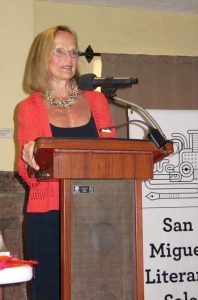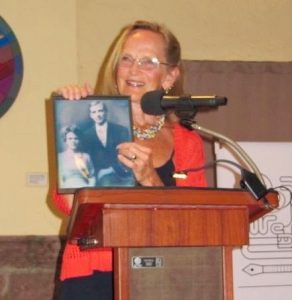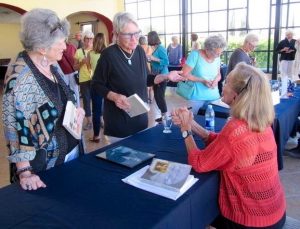In her memoir Lots of Candles, Plenty of Cake (which I reviewed here last December 30), Pulitzer-Prize-winning writer Anna Quindlen shared that always, whenever she teaches a creative writing class, she advises her students to “go deeper.” This effort – of diving, digging, drilling down, or whatever metaphor you choose – will make all the difference in the effectiveness of the work’s end result for the reader.
So much of our busy, frantic, distracted lives are lived on the surface, darting around like water bugs on a pond, trying to stay afloat. It’s only when we dive deeper, I feel, that we can truly connect with one another as human beings in all the most meaningful ways. (Isn’t this what Carl Jung was suggesting in his theory of the collective unconscious?)
When I wrote my first book, the memoir Somewhere Child (Viking Press, 1981), this digging felt like walking down a steep flight of basement stairs in the dark, then groping around, with a flashlight in one hand, looking through dusty boxes filled with file folders of potentially relevant memories. The process took hours each time I sat down to write, and it brought me to tears every day. But what I re-emerged with was worth the effort, fear, and pain because the book that resulted has done some good in the world. I feel it justified my existence.
Much more recently, with my fourth book, the novel Jamie’s Muse (Nighthawk Press, 2018), I had to dig deep also – this time farther into history – to find some of my ancestors and try to bring them back to life.
As I explained to the audience that attended the San Miguel Literary Sala readings this past Thursday evening, “The bones of this book are made of historical facts; but the heart, soul, lungs, sinew, blood, sweat, and tears of it are drawn from my imagination – inspired by my Scottish great-grandmother.”

I’d started my research more than ten years ago with my grandfather, John Black, and the few facts I knew of his life: He grew up in an orphanage in Edinburgh, ran away from that orphanage in his early teens, stowed away on a ship bound for New York at the turn of the last century, was taken in by a family named Wilkie in Morristown, New Jersey, and ultimately became a successful entrepreneur there.
When I wrote to the town of Morristown requesting a copy of John Black’s death certificate, I saw that he was born in Avoca, South Africa, in 1885; and in the place where his mother’s name belonged on this document was written “Unknown.”

Thus began my quest as a writer to find this mysterious great-grandmother and to tell her story – if only mostly from my imagination. Her name, I came to learn, was Helen Reid David Black, and she was a schoolmate and contemporary of James Matthew Barrie of Kirriemuir, Scotland. This James (“Jamie”) Barrie would later become famous as the author of Peter Pan; and, in my work of fiction, Helen would, through tragic circumstances, become his early muse.
Here is a small portion from the passages I read at the Literary Sala to illustrate their close friendship:
“Only Helen, among the women in his life who were not family, had accepted him [Jamie Barrie] for who and what he was, he felt. Only she had appreciated his idiosyncrasies and admired his creative talents. Once, he recalled, she’d even called him a genius.
“Upon her [untimely] death, then, Helen achieved a kind of sainthood in Jamie’s mind. He placed her on a lofty pedestal, near those of his mother and sisters, against which no other woman could humanly measure up. In his dramatic imagination, Helen, his first leading lady, the star of all his childhood theatrical productions, became his ideal.”
As I said to the audience on Thursday in closing, “It is my hope that those who read Jamie’s Muse will be inspired to go deeper into their roots to search for their own unknown ancestors and try to bring them back to life – if only in their imaginations. Because to be forgotten is a fate worse than death.”

